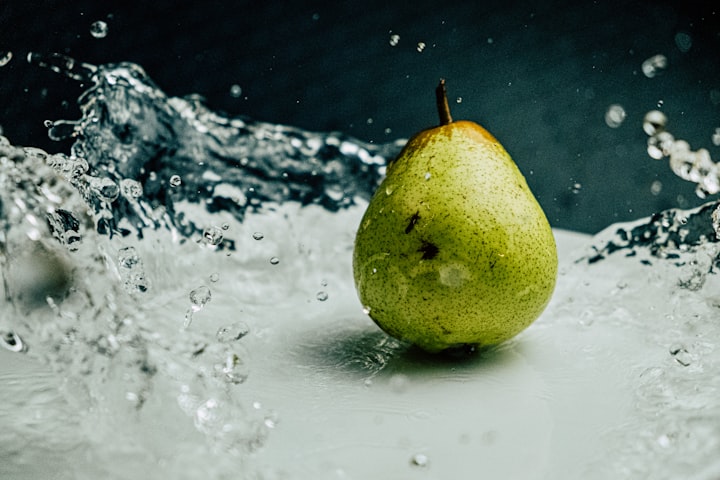To Drown a Pear
A short-story

Circe Elton was only twenty-two years old when she began working for The Facility. It was quite an honor to be sought out for a project of this caliber, especially given her youth, or so she had been told in one of the fifteen or so interviews that she ran through with her usual ease. Other people liked to tell her how proud of herself she ought to be at any given time-- an unconscious desire of inferior minds to assert some emotional control over a person they could not comprehend in the slightest. Other people did not know what to do when confronted by sheer, unadulterated genius. It made them doubt themselves, destabilized their over-inflated egos. But Circe did not care. In fact, she did not care about anyone at all.
And so when much older fools in her field told her that she should be honored by her position, a position she had secured by virtue of the uncanny strength and dexterity of her own mind, she would simply nod, contorting her mouth into a grateful smile, and gently narrowing her eyes to imitate the illusion of thoughtful awe. It was a sort of game to Circe, this human theatricality. She liked to make people believe that there was something warm and sympathetic and vivacious behind her eyes.
Really, Circe Elton was nothing less and nothing more than a churning, all-encompassing black hole. But no one else needed to know that. In fact, it was better if they did not. People did more of what you wanted them to when they thought that you were soft and sweet and feeling like them. And so she had gone about the tedious work of mimicking emotions as a child, until she could do it with a deftness that left little doubt in the mind of even the most careful observer as an adult.
When she was very young, Circe had imagined that the whole world must have been lying about love and connection, for she had never felt any of those things. She did not care when her mother cried late into the evenings huddled at the kitchen table, or her father hurt himself repairing the family Toyota, or when her little sister lost one of her dolls. Eventually, it occurred to her that there was something wrong with her. A kind of defect in her biochemistry that rendered her cold and impartial to anything.
Luckily, this defect gave her an advantage over everyone else. She could exist above the fray, purely practical, utterly self-preserving. Her parents had no clue that they were raising a psychopath, a seething absence that radiated quietly in the corner, an impossible void. Only that they had, somehow, between the two of them, produced a prodigy.
In elementary school, she skipped four grades. And still she was not satisfied. She doodled chains of molecules in her early notebooks; humming thoughtfully over organic chemistry treatises by the time she was seven.
Other girls crowded around her at recess, rattling off four digit numbers for her to multiply in her head. Some stuck around after she had finished her impossible calculations, curious about her mind, perhaps looking for friendship. But Circe had no use for friends.
At fifteen, she completed her B.S. in Micro-Cellular Biology at the University of California, Berkeley. From there, she received her PhD from Caltech. Her thesis was simply, and effectively titled, "An Exploration of Biological Immortality in Planarian Flatworms".
It was this dissertation that caught the attention of her current employers.
And so her research began. She was charged with the rather humble prospect of extending human life. She was to isolate the genetic and morphological characteristics that biologically “immortal” life forms exhibited and apply them to people. Because after all, who wouldn’t want to live forever? And The Facility, assured of the lucrativeness of such a venture, paid her handsomely, for her genius and her silence. Ethically and legally speaking, none of what went on under her microscope was sustainable, and so hers was a position of the utmost confidentiality.
There were two other people in her lab. Aden Bloomkvist was a few years older than she, with dark, carefully combed hair and an unpleasant face. His research, she knew, was focused on the potentialities that human cloning might have on longevity. The other scientist was Leda Brennan. Leda was in her fifties; a blonde, exhausted looking woman with watery eyes and immense spectacles. Her expertise was evolutionary development and vestigial organs, but she only showed up a few days a week.
They did not converse with each other, each confined to the intrigue of their own separate worlds. That all worked to similar ends mattered little.
For the past few weeks, Circe had been bent over petri dishes lined with slivers of fresh pear. One of the faceless assistants assured her that all samples had been taken from the same orchard, from the same pear tree in fact, to control for at least certain variables. Each sample was infused or grafted with a separate genetic profile-- some of the pears shared DNA with ocean quahog clams, others with red sea urchins, and still others with Turritopsis nutricula, a type of jellyfish. All of these species experienced on some level, the ability to forestall the impacts of aging, by refreshing cells or sustained fertility despite age. In the absence of DNA deterioration and shortened telomeres, perhaps a pear might be rendered similarly refreshed.
Previously hew work dealt purely with lobsters, which were not so much immortal in the typical sense, but rather subject to bio-indefinite mortality, or something close to it. Telomerase, the enzyme responsible for repairing damaged DNA, was isolated and extracted and transferred into pear slivers to determine if the enzyme might be transmissible to other life forms.
***
On one afternoon, Circe was taking notes on the limitations of the current experiment, when Leda broke their unspoken agreement. Circe had just finished writing:
Currently, only one sample shows promise (Turritopsis nutricula), which has not only retained proper pigmentation but also staved off mold and decay. Even if biological deterioration is halted ephemerally, organisms may still be vulnerable to termination from other means (i.e. illness or injury).
Aden had left a quarter of an hour before to take his lunch break. None of them ate together, preferring instead the amicable silence of their own thoughts.
“You’re making headway with the jellyfish, aren’t you Dr. Elton”, it was a statement, not a question. Circe looked into the older woman’s appraising blue eyes in surprise.
“I suppose,” she hummed back noncommittally.
Leda glanced furtively over her shoulder at the cameras stationed in every corner of the lab. She licked her lips anxiously.
“You must sabotage it, your experiment,” she whispered in an undertone, “It must not succeed.”
Circe blinked, unsure of whether or not to laugh. Was this some kind of queer joke?
“Excuse me?” she allowed, raising her eyebrows.
“You’re a scientist, Ms. Elton. You know that humanity cannot be allowed to achieve this kind of power. We don’t have the conscience for it. We would just as easily destroy the world as we would save it, and biological immortality is not something we need in our arsenal.”
“So why exactly are you employed here, if you don’t believe in the mission?”
“I used to be like you,” Leda explained a little fervently, her brow furrowing, “Optimistic about the fate of this world, excited to change the course of human scientific history for the better. But I’ve worked here for long enough to know that The Facility is disingenuous in its intentions. Humanity is not ready for eternal life, and it’s irresponsible to market it.”
For a moment, Circe felt disoriented. Perhaps this was a test of some sort, by the upper management to make sure she was loyal to her research. That was the sort of thing she would do if she were in charge here.
“Perhaps you ought to take some time off,” she returned, face blank. Besides, it was utterly laughable that this woman thought she gave any thought to the good of humanity itself.
***
That night, Circe dreamed for the first time in many years.
She was wandering about in an underwater castle, surrounded by miniature jellyfish, which exuded a kind of light that splashed across the stone walls. In her hand, she clutched a single perfect pear. A pear that was throbbing and pulsing in her palms, in the manner of a human heart. She longed to leave the pear behind her for it frightened her, but it was stuck to her fingers. When she attempted to pull it from her skin, she felt pain radiate up her arms. The jellyfish hovered around her, bobbing elegantly as she cried beneath the sea.
From across the sea floor, Leda swam towards her in steady strokes.
“You must not let the experiment succeed. Terminate it now or I shall do it for you,” the older woman threatened, her mouth opening to reveal row upon row of pointed teeth.
Circe shook her head, unable to speak. She attempted to shake the pear loose from her grasp but it was still branded to her skin.
Leda drew ever closer.
“I don’t want to hurt you, but if you don’t give me the specimen, I’ll have to,” she reiterated, her teeth elongating.
Circe woke in a cold sweat, her breath coming in unsteady gasps. She glanced down frantically at her hands, and finding them smooth and normal, she began to relax back into the covers.
***
The next morning, bent over her lab bench, Circe could not help but feel uneasy. Leda had not appeared for work, and so it was all very foolish.
From across the room, Aden got to his feet, reaching for the key card to the bathroom down the hall. When he was gone, she let out a small sigh of relief. She would have a few moments to herself.
She gazed down into the eye of her microscope, at the sliver of pear that had managed to regenerate itself miraculously, despite the damage to its form. Soon, perhaps by the end of the day, she could report her findings to management. They would be elated.
But something held her back. Perhaps it was the nightmare, or the intensity in Leda’s gaze the day before. Perhaps it was the vague sense of dread that had always been present in her chest from the moment she registered her own consciousness. A sense of dread at her own propensity for annihilation.
She had, under her fingers, the thing that could sustain life interminably. But at what cost?
Humming to herself softly, hardly registering what she was doing, she turned on the faucet, and picked up the petri dish in her steady hands. Without turning around to look at the cameras, she emptied the contents of the dish into the sink drain.
How odd, she thought, as she watched her own personal eternity slide away. For it was now, for the first time, that she began to feel something like rightness in her chest. A sense of connection to the universe itself. For once, she was not thinking of herself.
About the Creator
Katie Alafdal
queer poet and visual artist. @leromanovs on insta







Comments
There are no comments for this story
Be the first to respond and start the conversation.